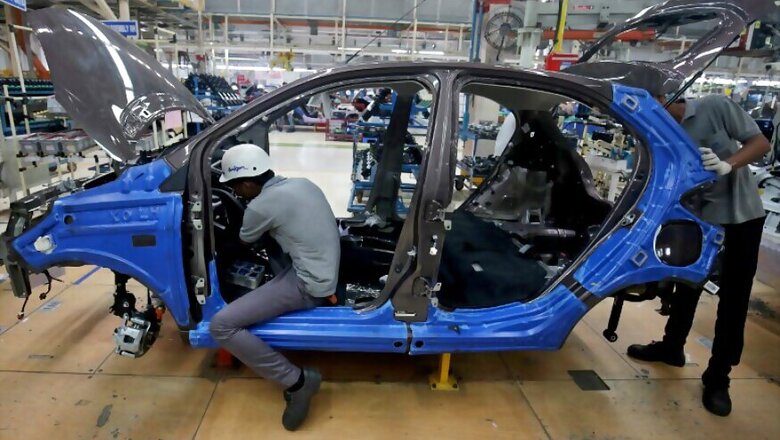
views
India is among the top five automobile manufacturers in the world. The vast assembly lines of our automobile manufacturers were churning out nearly 6,150 passenger cars on an average each day till last month despite a widespread domestic slowdown impacting sales.
It is true that production was lower in this 11–month period (April 2019 to February 2020) compared to the same 11 months in the previous fiscal, when Indian factories were averaging nearly 7,500 cars a day. But at least production was happening on schedule.
Besides cars, the country was also producing a little over 17,000 scooters and well over 40,000 motorcycles on an average every single day till February. In all, India was churning out close to 75,000 cars, SUVs, three–wheelers, small CVs, trucks and motorcycles every day. The majority of Indian vehicle production has traditionally been sold in the domestic market, with exports accounting for nearly 18% or every sixth vehicle. So Indian auto factories were not just feeding Indian markets but also sending vehicles globally.
But with the COVID-19 pandemic and widespread lockdowns across India starting this week, vehicle manufacturers have begun putting locks on factory gates. Biggest carmaker Maruti Suzuki India announced on Sunday that it has indefinitely ceased production at its Haryana facilities due to the lockdown. Other car makers and manufacturers of other vehicle categories have also announced similar shutdowns, in what is fast becoming an unprecedented closure of vast swathes of manufacturing plants across the country, spanning various industries.
An industry veteran said that apart from a brief stint of closure due to non-availability of spare parts some three years ago and the annual maintenance shutdowns, the Maruti facilities have never ever been shuttered. It is a never-before situation and no one is quite clear about when the lockdown would be lifted.
Then, the world’s largest manufacturer of two-wheelers, Hero MotoCorp, has also shuttered its factories across India besides those in Colombia and Bangladesh; its Global Parts Centre in Rajasthan has also been locked. Hyundai Motor India, a major exporter of cars from India, has also shut down production at Chennai.
Not vehicle makers, other large manufacturing plants are also closing down due to the pandemic. Apollo Tyres, which has a manufacturing plant each in Chennai and Vadodara and two in Kerala has halted production in three facilities while the fourth is operating partially. As COVID-19 fears prompt entire cities to impose a lockdown, machinery across manufacturing plants has stopped whirring not just for vehicle makers but also for makers of automobile components and for ancillary industries.
Apart from automobiles, other industries which have large manufacturing plants in India are similarly impacted. Samsung India’s manufacturing facilities in Noida and Tamil Nadu have been shut. The Haryana-based facility of Japanese major Panasonic, which manufactures washing machines, refrigerators, air conditioners and audio products here, has also been locked.
In fact, the production sites of most electronic items, including mobile handsets, televisions, refrigerators, washing machines etc. across most consumer durable manufacturers in India are shuttered. This, when India had gradually ramped up its status as the second largest manufacturer of mobile handsets, after China, in the last few years with an explosion in the number of brands and sheer number of handsets being made in the country.
The mass factory closure would hurt consumer durable companies hard, since summer is the peak sale season for many of these durables and a lockdown at the beginning of the peak season would have a disproportionately higher impact on the market for these products.
Not only is this the wrong time of the year to have to halt production, the unprecedented nationwide manufacturing shutdown also comes just when China appears to be limping back to normalcy. Analysts have already warned that China’s factories are back in action and that country is back to over 80% of its manufacturing capacity already.
China was the undisputed manufacturing hub of the world, with nearly 28% share of the global manufacturing output, pushing products into markets all across the globe. Since the pandemic affected it first when India’s factories were still functional, we had a chance of reducing China’s manufacturing dominance but now, that chance is over.
This unprecedented shuttering of India’s factories also further hampers the ambitious ‘Make in India’ scheme, outlined by Prime Minister Narendra Modi in his first term in office. At that time, Modi had envisaged taking the share of the manufacturing sector to 25% of GDP by 2022 through focused emphasis on making India a manufacturing hub through sustained policy help. Also, the thinking was to create 100 million additional jobs in the manufacturing sector by 2022. But a severe economic slowdown, seen during the last several quarters, and consequent widespread job destruction -- instead of job creation -- was already threatening the dream of making India a manufacturing powerhouse. Currently, manufacturing accounts for about 15% of India’s GDP.
With the COVID-19 lockdowns, it would now be near impossible to achieve the ‘Make in India’ goals.




















Comments
0 comment